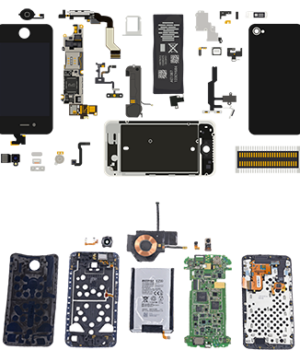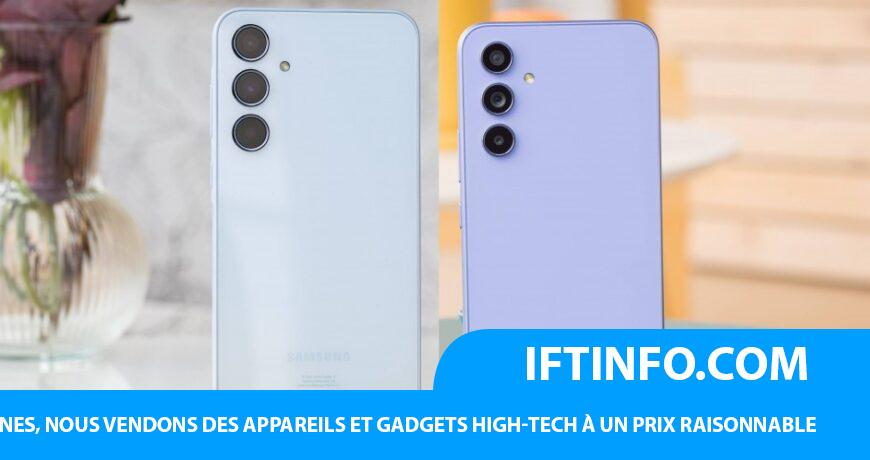IFTINFO – Samsung Galaxy A35 vs. Samsung Galaxy A54 laissez un commentaire
[ad_1]
So, you find yourself looking for a Samsung midranger. At around €480, the Galaxy A55 is admittedly quite pricy and you notice that the Galaxy A35 gets you a lot of the way there at a more reasonable starting price of €380.
But do some digging, and you will notice that last year’s Galaxy A54 is also worth considering in this price range. It has depreciated quite nicely (from consumer’s point of view) and can be found selling for less than the A35 on average.
So that’s an interesting conundrum right there. There are certainly positives and negatives to going either way, and we’ll do our best to cover them in this comparison.
Table of Contents:
For starters, you can compare the complete specs sheets or directly continue with our editor’s assessment in the following text.
Size comparison
Despite Samsung’s slightly confusing numbering scheme, the Galaxy A35 is the bigger device of the two. It has a larger 6.6-inch display, compared to 6.4 inches on the A54, and that sort of difference is certainly noticeable.
The new A35 is not that dissimilar to its Galaxy A34 in terms of dimensions, but it has become notably heavier, tipping the scale at 209 grams this year. That also makes the A35 heavier than the A54, which weighs in at 202 grams. Of course, this is not an appreciable difference in practice, but it is still worth pointing out since it indicates the updated bill of materials.
Indeed, the Galaxy A35 has gotten a more premium build this year. The back is now made of glass instead of plastic. The front glass has been upgraded to Gorilla Glass Victus+. While far from the most premium hardened glass Corning has to offer, it is definitely an upgrade over the Gorilla Glass 5 that both the Galaxy A54 and A34 are rocking. Regarding durability, we should mention that both the A35 and the A54 offer the same IP67 ingress protection rating, so there is no difference there.
We should talk about the design briefly. The Galaxy A34 and A54 are rocking last year’s design, which is noticeably rounder, especially when it comes to the uniform middle frame.
In contrast, the Galaxy A35 has a new and updated look, including flatter sides and an elevated portion of the middle frame where the buttons reside.
Left: Galaxy A35 • Right: Galaxy A54
Also, as part of the new look, the Galaxy A35 no longer has its predecessor’s teardrop notch stile camera. It has been swapped for a punch-hole style unit, which arguably makes for a more premium look, in line with the higher-end Galaxy 5X family. That means that visually, from the front, there isn’t much of a difference between the A35 and A54. The display bezels are slightly thinner on the A35, but not by a lot.
In terms of color options, the choice is definitely going to depend on personal preference. The A54 arguably has some more “traditional” color options in there. It is available in Lime, Graphite, Violet and White. The A35 can be found in Iceblue, Lilac, Navy, and Lemon.
As we said, the A35 and A54 are very similar in terms of controls and layout. Both have stereo speaker setups and optical under-display fingerprint readers. NFC is available on both models in most markets. Both also have expandable storage via a microSD slot, shared with the second nano-SIM slot. Neither model has a 3.5mm audio jack or an onboard FM radio receiver. It is also worth noting that despite their different relative market positioning, both, unfortunately, are equipped with proximity sensors of the virtual type.
Display comparison
Not much has changed about the display on the Galaxy A35 coming from the A34. In fact, it might even be the same 6.6-inch, 120Hz Super AMOLED panel. The Galaxy A54 has a slightly smaller 6.4-inch display but with the same 1080 x 2340-pixel resolution. The refresh rate is the same at 120Hz, and it’s handled in the same fashion.
In our testing, we measured similar brightness levels on the Galaxy A54 and the A35. Neither is industry-leading, but both are good enough to be usable outdoors.
The only noteworthy difference is that the Galaxy A54 is officially certified for HDR10+, while the A35 lacks any formal HDR certification. Some apps, notably YouTube, will still offer HDR streams to the A35 and will max out its brightness during playback. Still, there is no official HDR support and apps like Netflix don’t offer HDR streams.
Battery life
Both phones have large 5,000 mAh batteries on board and use the same Exynos 1380 chipset. There is a slight difference in display size between the two, but overall battery life is expected to be very similar.
That being said, Samsung has clearly managed to optimize things a bit from the A54 to the A35 since the latter has notably better battery life. Mind you that our testing for the Galaxy A54 was done on Android 13 and One UI 5.1, whereas the Galaxy A35 was tested on Android 14 and One UI 6.1. Hopefully, at least some of the battery improvements are in software and will also be delivered to the Galaxy A54.
Charging speed
Both the Galaxy A35 and A54 technically support Samsung’s 25W PPS + PD-based charging. Since both have the same battery capacity, one would expect that they would charge at the same rate. However, our testing discovered that the Galaxy A54 charges quite a bit more quickly than the Galaxy A35.
You can expect a full charge in just over an hour on the A54, whereas the A35 takes closer to an hour and a half. And you generally get higher charge percentages at any checkpoint along the A54’s charging curve. It’s not a groundbreaking difference, but it’s still worth pointing out.
Speaker test
The Galaxy A35 and A54 have a similar hybrid stereo speaker setup with one dedicated bottom-firing speaker and the amplified earpiece acting like the second channel.
Both phones perform very similarly in our standardized loudspeaker testing. Both manage a GOOD loudness rating with great overall quality – nice vocals, clear highs and even some bass. Of course, there is a very slight difference in tuning between the two devices, but hardly worth pointing out.
Performance
This year, the Exynos 1380 has essentially trickled down and is now powering the Galaxy A35 as well, so both are based on the same silicon. It is a modern 5nm chip with an octa-core CPU setup consisting of four Cortex-A78 cores, closed at up to 2.4 GHz and another four Cortex-A55 cores, working at up to 2.0 GHz. The onboard GPU is a Mali-G68 MP5 unit.
As for storage and memory, both models have a base config with 128GB of storage and 6GB of RAM and go up to 8GB of RAM and 256GB of storage. Storage is expandable via microSD on both too. The Galaxy A54 does seem to have more storage and RAM options available.
Since both the A35 and the A54 use the same chipset, you can expect the same performance across the two effectively. While this is definitely true, and you won’t notice any difference in practice, looking at benchmarks, it is clear that Samsung somehow managed to squeeze a bit more CPU performance from the chip in the newer Galaxy A35.
Again, we can’t say whether this small performance upgrade is purely due to software and, hence, can also be expected on the A54. It is not something to fixate on, though.
It is worth mentioning that Samsung seems to have addressed a thermal-throttling issue that was originally present when we reviewed the Galaxy A54. The Exynos 1380 seems to behave a lot better and more consistently while doing stress testing inside the A35. The difference in thermal-throttling behavior between the two phones is pretty significant, and we believe that it is thanks to some hardware tuning, not just software alone.
While this won’t necessarily be something that most users will notice in real-world use, it is worth noting that the Exynos 1380 is much more stable and has better sustained performance inside the Galaxy A35.
Camera comparison
The Galaxy A35 and A54 have similar camera setups at first glance. Both phones have a 50MP main camera. However, they use different sensors. The Galaxy A54 has a bigger 1/1.56″, 1.0µm sensor (likely Samsung’s GN5 or Sony’s IMX766).
The A35, on the other hand, has a smaller 1/1.96″ sensor for its main cam. As far as we managed to ascertain, it is a Samsung ISOCELL (S5K)GN8, which appears to be exclusive to this phone model.
Both phones have Optical Image Stabilization systems on their main cameras.
The A54 also has a higher-resolution 12MP ultrawide camera at its disposal, compared to the 8MP unit on the A35. Neither has autofocus, unfortunately. The third camera on the back of both models is a 5MP macro shooter with fixed focus.
On the front, the A54, once again, has a much higher resolution camera (32MP) with a bigger sensor (1/2.8″). The A35 settles for a 13MP, 1/3.06″ unit. Neither has autofocus, but surprisingly, both can capture 4K selfie video.
Image quality
Both phones capture 12.5MP photos with their main cameras by default due to pixel-binning. It is very hard to pick a definitive favorite from the pair since both offer similar overall quality. If we really had to choose, perhaps we would give a slight edge to the A35 for its slightly more laid-back processing with less sharpening applied. Again, however, the difference is pretty minor.
Samsung Galaxy A35: 12.5MP main camera samples
Samsung Galaxy A54: 12.5MP main camera samples
Despite the difference in resolution between the ultrawide cameras of the two phones, we can’t say that the Galaxy A54 has any noticeable lead in terms of detail. In fact, fine detail seems to be a bit cleaner and sharper on average on the A35. The difference is, again, not particularly big.
Samsung Galaxy A35: 8MP ultrawide camera samples
Samsung Galaxy A54: 12MP ultrawide camera samples
In another sort of mismatch between resolution and quality, we have to say that, on average, we like the 13MP selfie shots of the Galaxy A35 a bit better than the 12MP selfies that come out of the 32MP camera of the A54. The Galaxy A35 captures a bit cleaner and more defined facial features with better skin tones on average.
Samsung Galaxy A35: 13MP selfie camera samples
Samsung Galaxy A54: 12MP selfie camera samples
Low-light photos, both at 1x and 2x zoom, look very comparable between the A35 and A54. These are generally quite clean, have low noise, and have plenty of detail. Dynamic range is surprisingly wide, with well-developed shadows and highlights.
The ultrawide on the A54 seems to have a slight edge in detail over the lower-resolution one in the A35. The difference isn’t huge, but it is worth pointing out.
Video quality
Both the Galaxy A35 and A54 can capture video at up to 4K resolution on their man cameras. This is done in a standard AVC/h.264 video stream at around 48 Mbps and a standard stereo AAC stream inside an MP4 container. Alternatively, you can choose to use HEVC/h.265 to save some space.
4K footage from the main cameras of both phones is comparable in terms of overall quality. There is plenty of detail, although we would say that the A54 has a slight edge. Dynamic range and contrast are solid across the board. Colors are a bit on the saturated side, especially on the Galaxy A35, but nothing too overboard.
Samsung Galaxy A35 video: 0.6x • 1x • 2x
Samsung Galaxy A54 video: 0.6x • 1x • 2x
The Galaxy A54 has a clear edge over the A35 when it comes to 2x and ultrawide videos since it can do 4K video capture across the board, whereas the A35 is limited to 1080p on its ultrawide and, for some weird reason, at 2x zoom as well. The difference in detail and overall quality is very noticeable and in favor of the A54.
As for low-light video quality on the main cameras at 4K, the two phones trade blows. The A54 seems to be a bit cleaner overall, with more fine detail in the frame. The A35 isn’t far behind, though, and we like how it handles light sources better.
Samsung Galaxy A35 low-light video: 0.6x • 1x
Samsung Galaxy A54 low-light video: 0.6x • 1x
The ultrawide low-light video is a clear win for the Galaxy A54. The 1080p footage from the A35 is very dark and soft.
Verdict
Both the Galaxy A35 and the A54 are excellent, well-rounded mid-range devices. Also, as it turns out, they are incredibly similar.
Despite technically belonging to the “higher-tier”, the A54 doesn’t offer any major features that you won’t find on the A35. The 4K video capture on the ultrawide is nice, but it is hardly a must-have. The same goes for the HDR video certification, especially given that the displays on both phones have very similar performance and maximum brightness. And finally, the A54 charges notably faster than the A35, but again, we don’t really see that as enough of an incentive to buy it over the A35.
Both the A35 and A54 offer four years of OS updates and five years of security patches, but the A54 is already a year into that schedule. The Galaxy A34’s implementation of the Exynos 1380 is running cooler without any performance penalty. It also has a larger screen with Gorilla Glass Victus+ while remaining almost the same size and weight. And finally, it’s also scored better battery runtimes in the web browsing/social media and gaming scenarios.
Overall, when choosing between the Galaxy A35 and the Galaxy A54, we would personally go for the A35 if the two were priced similarly. In practical terms, neither will disappoint, and they offer remarkably similar experiences. So, in the end, the final decision could very well come down to which one of the two can be found as the better deal.
Get the Samsung Galaxy A35 for:
Samsung’s latest design language.
The more premium build with Gorilla Glass Victus+ instead of Gorilla Glass 5.
The larger 6.6-inch display.
The slightly better battery endurance.
The better-sustained performance and less thermal-throttling.
The longer software support.
Get the Samsung Galaxy A54 for:
The HDR10+ video certification.
The faster charging rate.
4K video capture on the ultrawide camera.
[ad_2]








